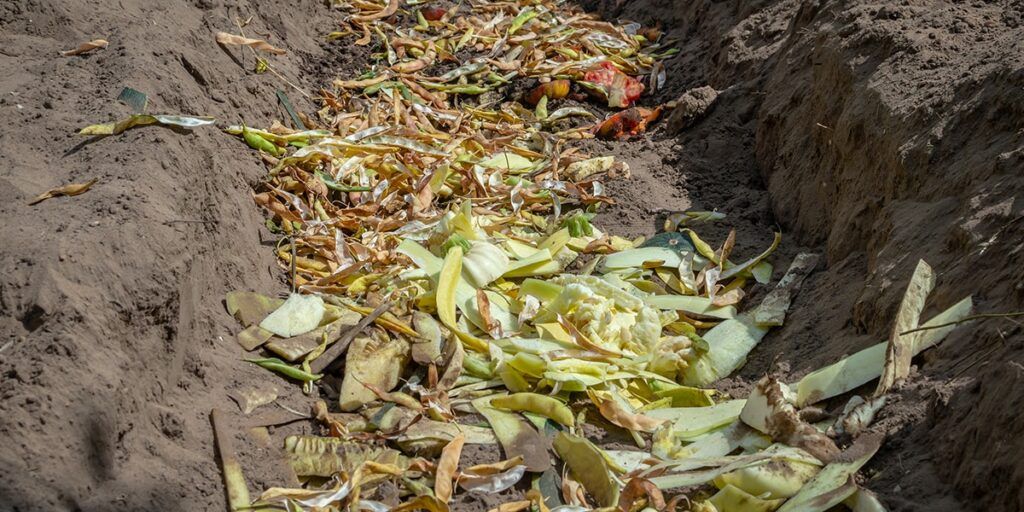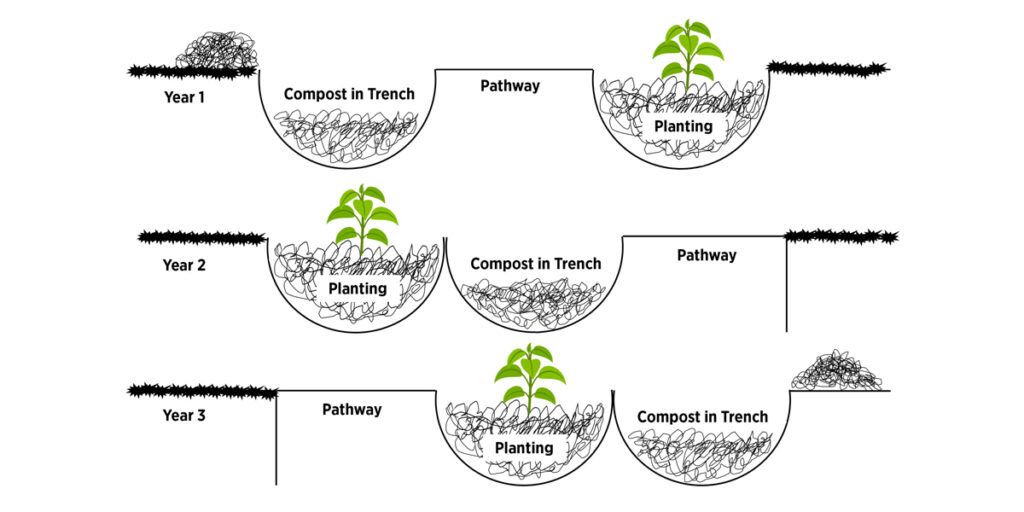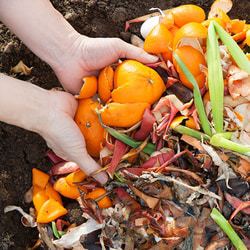
By Angelo Randaci, Earth’s Ally Horticulturist
Angelo’s passion for plants has led him to explore many areas of horticulture including research, grounds management, technical training, design and nursery management.
Advantages of Trench Composting vs. Conventional Composting
Composting has many benefits. It produces nutrient soil that helps to retain moisture and reduces the need for chemical fertilizers. It encourages the production of beneficial bacteria and fungi which break down organic matter to create humus. But what is humus, and what is humus made of? Humus soil is a key ingredient for a flourishing garden. Humus is the dark organic matter that forms in soil when plants break down through the action of anaerobic organisms. Decomposed humus is made up of nutrients, including minerals, that improve the health of your plants by creating nutrient rich soil. It’s easy to make your own humus at home using various types of organic matter with food and garden waste being the most important. According to the United States Department of Agriculture, between 30 and 40 percent of food is all recyclable but instead is thrown away. Composting garden waste and kitchen scraps will build your soil while reducing landfill waste.

While composting is a good way to eliminate food and yard waste, many of us don’t have space for a compost pile or bin and there is considerable work involved with creating a compost pile. You must tend your pile to make sure the composition of your ingredients are in the proper proportions to avoid foul odors. You also need to add moisture and turn your compost periodically to allow air to permeate the pile. But there is new, easier method to create rich humus without all the hard work. It’s called Trench composting.
What is Trench Composting?
Trench composting, or trenching, is a way to compost food scraps and yard waste without having to go through the steps necessary to conventional composting. The steps are simple:
- Dig a trench, or any shape hole about 12 – 18 inches deep (18 inches is better)
- Add 4-6 inches of compostable materials
- Simply fill the hole with the soil you dug out of the trench or hole
That’s all there is to it. There are four methods of trench composting that all work well. Choose the one that works best for your gardening situation.
Method #1: Dig and Drop
This is the easiest method, especially if you need to compost large amounts of material at once. Use this method during the off season. Dig a hole 12 inches deep and wide enough to bury your collected garden and kitchen waste. Cover it with soil and within a few months you will have enriched your soil.
Method #2: Trench Between Rows, the Side Dress Method
This method is effective during the growing season but can be done off season as well. It is used to enrich soil around existing plants. Dig holes or trenches a few inches from the roots of your vegetables, flowers, or shrubs and bury your compostable materials. You may have to go further out with your trench for shrubs to avoid harming roots or practice this method for newly planted shrubs and trees.
Method #3: Trench Rotation Method
This method also works during the growing season. Divide your garden into three zones: trench, pathway and growing zones. The trench zone is where you will add compost, the pathway zone is where you will walk, and the growing zone is where you will plant. Rotate these three zones each year, moving your trench, pathway, and growing zones to different areas of your garden. You will have completed the cycle after three years, enriching the soil to your whole garden.

Method #4: Post Hole Digger or Spot Trenching Method
Use a post hole digger to dig either a row of holes in your garden area or outside the drip line of trees and shrubs. Follow the same procedures as the other methods. Dig the holes, put in your compostable materials, and cover.
Some examples of compostable materials are:
- Kitchen scraps like fruit, vegetables, coffee grounds and tea bags.
- Garden waste like grass clippings, leaves and weeds.
- It’s important to note that you should not use grass clippings and weeds that have been treated with harsh chemical pesticides. Sea Salt alternatives like Earth’s Ally Weed & Grass Killer are not harmful to the soil or future crops.

Top 5 Benefits of Trench Composting:
- It is the easiest method. You won’t have to worry about maintaining moisture levels or aerating your compost pile.
- The only tool you need is a shovel.
- You will not have odors coming from your trenches as long as your compostable materials are buried at least 18” deep and covered.
- Trench composting places the organic matter at the root zone where it is most beneficial. Roots will develop a stronger root system because the roots will travel deeper into the soil to reach the nutrition given from the compost.
- It is more aesthetically pleasing than a compost pile and can be placed anywhere in the garden because it is invisible.
Earth’s Ally Composting Tips for Beginners:
- You can layer scraps and garden waste in your trench or hole for faster decomposition. Alternate dry trench composting leaves with wet scraps.
- Keep meat, bones, fish, fat, and dairy out of your compost. Avoid animal waste, diseased plant material and weeds with seeds. Do not add large sticks or branches because they take the longest to decompose, and do not add wood that may be chemically treated.
- Do not plant on top of the trench area until the material in your trench has decomposed because the area may sink as decomposition occurs.
- Trench composting also works for leaves during the fall months. Bury them the same way throughout your garden and landscape beds. Shredding the leaves beforehand either with a mower or leaf shredder will help the leaves decompose faster. Mix them with grass clippings or vegetable waste to add nitrogen to hasten decomposition.
- Mark your holes to indicate where you have buried your scraps to prevent accidentally digging them up.
We’d love to hear how articles like this one and Earth’s Ally organic gardening products are helping you grow healthy plants. Share your experience and stay connected with the #EarthsAlly community on Facebook, Instagram and Twitter for access to our latest blog posts, giveaways and exclusive promotions.
